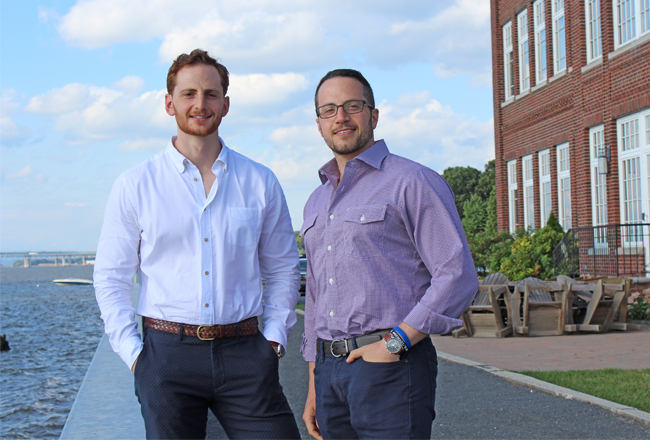Reunion Foods continues family legacy in Irvington
Three siblings rooted in a family meat business are branching out to organic animal proteins.
Ben, Jessica and Seth Mosner founded Reunion Foods last year and they recently opened a 1,200-square-foot headquarters in Irvington.
Seth, the CEO, and Ben, the chief business development officer, recently sat down to discuss their business strategy. Jessica, the chief marketing officer, was out of town.
“We are an organic, organic food company,” Ben said.
By which he means they grew into the business naturally by virtue of their experience at Mosner Family Brands and by their lifelong embrace of a health and wellness lifestyle.
Reunion sells organic pork and grass-fed organic beef and lamb, free of antibiotics, hormones and genetically engineered ingredients, from animals that graze in pastures. The food is sold to retail, food service, e-commerce and manufacturing customers.
“All meat is not created equal,” Seth said.
They have been honing their concept for six years, while continuing in the family business.

The original business plan was titled the “Compassionate Carnivore.” While that phrase might be jarring to a vegan, they say it embodies an ethic that connects consumers to the people, places, animals and environment that go into creating a nutritious meal.
“Big business would never be able to do that,” Seth said.
The path to the grocery store meat counter is not easy.
Consumers tend to look for a brand when they buy meats, and branding, Ben said, is a matter of confidence.
“People want to trust what they”™re eating.”
But food labeling can be confusing. “Grass-fed” can mean that a steer was fed on grass for only a short time. “Natural,” under federal regulations, means minimal processing but does not exclude antibiotics.
Their ambition is to be transparent about how they achieve high standards.
The Reunion nutrition panels will be explicit: 100 percent grass-fed, no antibiotics ever, no added hormones, never confined, never fed animal byproducts.
They have spent three years building a global supply chain in Australia, Canada, Uruguay and the U.S., finding farmers who are capable of satisfying their standards and willing to be certified and audited by third-party organizations.
Production costs are higher compared with industrial agriculture, where animals are fed corn and soy in confined feedlots. A Reunion steer, for example, gets pasture space as large as a football field. It is not given stimulants so it takes longer to get up to market weight.
But the animal is healthier, Seth said, the meat is more nutritious and the environment is less stressed.
Ben said the taste is clean and earthy, “the way nature intended.”
Even the name, Reunion, is meant to evoke the ideas of connecting people, encouraging collaboration and supporting communities.
“Aren”™t we just selling food,” Seth asked. “Sure.”
But meat can be an excuse to get together. The dinner table is a place where people share values.
The name also associates their venture with the family legacy.
Their origin story can be traced back more than 70 years to David Mosner, their grandfather, a son of Eastern European immigrants who went to work in the meat trade when he returned from service in World War II.
David had no notion of creating a business dynasty, Seth said. He was just trying to support a family of seven as a meat salesman.
But when his request for a $5 a week raise was rejected, according to family lore, he borrowed $300, bought a used station wagon and set out as a jobber. He filled his wagon at the wholesale market and delivered meats to butchers and restaurants.
The Mosner company was incorporated in 1957.
David died about 20 years ago. Now his sons, Michael and Philip, run the company, and it has grown into one of the largest meat purveyors in the Northeast.
The grandchildren were encouraged to make their own careers, but not necessarily in the family business.
Ben worked on Wall Street. Jessica worked as a fashion merchandiser. Seth was a management consultant.
All found their way back to Mosner Family Brands, where they still have responsibilities and are part of the ownership group.
But Reunion is independent. It has no outside investors and it is making it on its own revenues.
The partners set up the Irvington headquarters in part to separate themselves from the hustle and bustle of the family business in Hunts Point.
Looking out the windows at the Bridge Street Campus, a renovated factory on the Hudson River, the Manhattan panorama is on the left, the Palisades is straight ahead and the new Gov. Mario M. Cuomo Bridge is to the right.
“It”™s a piece of serenity,” Seth said.
He said the views and the energy of the place and the ethos of like-minded tenants on campus, focus him.
And there is a business to run. Meats from around the world are arriving at the docks. They are perishable. They must be moved to market.
Reunion has found an outlet in the past year or so with makers of meal kits, jerky and other snack products.
But their strategy is to become a mass-market retailer. By next month they expect to start national retail sales through a network of organic food distributors.
So far this year, Reunion has booked more than $6 million in the business-to-business market. Ben said they expect to surpass $10 million by the end of the year as they ramp up in the retail market.
He would not disclose the profit margin.
They aspire to $100 million a year, Seth said, a significant target in the organic field but a mere rounding error in the world of commodity proteins.
Success depends on consumers who care about how animals are treated, are willing to pay more for taste, want more nutritious meats and trust that Reunion is not cutting corners.